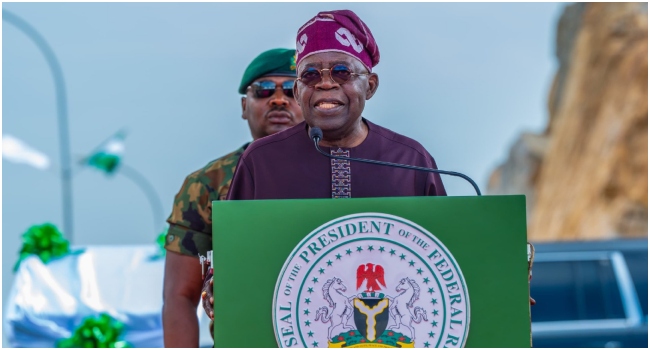
In a significant judicial development, the United States District Court for the District of Columbia has directed two prominent American law enforcement agencies—the Federal Bureau of Investigation (FBI) and the Drug Enforcement Administration (DEA)—to release records concerning a past investigation involving Nigerian President Bola Ahmed Tinubu.
Presiding Judge Beryl Howell issued the ruling on Tuesday, concluding that the government’s attempt to shield the information from public view was “neither logical nor plausible.” The order was issued following a motion for reconsideration filed by Aaron Greenspan, an American transparency advocate who had earlier accused the FBI of breaching the Freedom of Information Act (FOIA).
The case revolves around Mr. Greenspan’s efforts to access documents tied to federal investigations from the early 1990s. Specifically, he sought information regarding a Chicago-based heroin trafficking network and financial activities linked to several individuals, including President Tinubu and one Abiodun Agbele. The investigation resulted in Tinubu’s 1993 forfeiture of $460,000 to the U.S. government, a transaction widely believed to have stemmed from suspected drug-related proceeds, though no criminal charges were filed against him.
In his pursuit of the records, Mr. Greenspan filed a dozen FOIA requests between 2022 and 2023 targeting six U.S. government agencies: the FBI, DEA, Internal Revenue Service (IRS), Executive Office for U.S. Attorneys (EOUSA), Department of State, and later the Central Intelligence Agency (CIA). The agencies uniformly responded with what is known as a “Glomar response”—refusing to confirm or deny the existence of the requested records. Greenspan appealed those denials through the Department of Justice’s Office of Information Policy, which upheld the agencies’ positions.
Unyielding, Greenspan proceeded to sue the agencies in June 2023, demanding judicial intervention. He later filed an emergency motion in October 2023 requesting expedited release of documents in light of Nigeria’s Supreme Court proceedings regarding the legality of Tinubu’s presidential election. The emergency motion was denied, but President Tinubu formally joined the case days later, arguing for the protection of his privacy and confidential records.
While the court upheld the CIA’s refusal to confirm or deny the existence of relevant records, Judge Howell found the FBI and DEA had improperly applied the Glomar doctrine. She ruled that their claims were invalid, particularly in light of public disclosures and confirmed past investigations involving President Tinubu.
The judge noted that Greenspan’s arguments established sufficient grounds to challenge the agencies’ refusal. These included DEA’s previous confirmation of Agbele’s role in a drug ring, the FBI and DEA’s confirmed investigative interest in Tinubu, and the broader public interest in the case outweighing any personal privacy concerns. She added that “at this point,” it was illogical to argue that withholding the information was necessary for privacy or national security.
Key among the court submissions was a 1993 affidavit filed by IRS Special Agent Kevin Moss. The document outlined how U.S. law enforcement tied Tinubu’s financial accounts to proceeds from narcotics trafficking in the Chicago area. According to Moss, DEA agents arrested Agbele during a heroin sale to an undercover officer, with further investigations linking him to Mueez Akande—identified as Tinubu’s associate—and establishing Tinubu’s connection to bank accounts suspected of laundering drug money.
Despite forfeiting the $460,000, Tinubu has consistently maintained his innocence and was never indicted or charged. Nonetheless, the forfeiture and its implications resurfaced during Nigeria’s 2023 presidential election disputes. Both Atiku Abubakar of the People’s Democratic Party and Peter Obi of the Labour Party referenced the forfeiture in legal challenges, which Nigeria’s Presidential Election Petition Court ultimately dismissed.
Following the latest court order, the judge has instructed the remaining defendants—excluding the CIA—to jointly file a report on unresolved issues by May 2, 2025. The narrowed focus of the litigation now centers solely on Tinubu and Agbele.
This ruling opens the door for potentially significant disclosures, marking a turning point in the long-standing efforts to unearth documents linked to a controversial chapter in the Nigerian president’s past.




